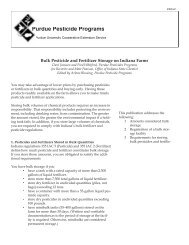Pesticides and Risk Communication PPP-52 - Purdue Pesticide ...
Pesticides and Risk Communication PPP-52 - Purdue Pesticide ...
Pesticides and Risk Communication PPP-52 - Purdue Pesticide ...
Create successful ePaper yourself
Turn your PDF publications into a flip-book with our unique Google optimized e-Paper software.
Earning Confidence:<br />
Working with the Audience<br />
People are often skeptical of large companies, big government, or<br />
any organization that wields power. So when representatives of<br />
academia, government, or industry offer assurance relative to pesticide<br />
safety, their effectiveness may hinge on trust—or lack of it.<br />
Trust pertinent to risk management is earned by acknowledging<br />
people’s fears <strong>and</strong> providing information on which they can base their<br />
own informed choices. It is molded by competence <strong>and</strong> character:<br />
Competence is a matter of relevant expertise, while character is reflected<br />
by the integrity <strong>and</strong> fairness of the individual.<br />
Trust in an individual—a risk communicator—begins with a good first<br />
impression. If your audience perceives that you care about their wellbeing,<br />
they will trust what you tell them. But trust is best earned by<br />
matching words with actions.<br />
Reflecting the Audience’s Perception<br />
The best way to reach an audience is to address their concerns.<br />
When you commit to making a presentation, ask the program sponsor<br />
to identify any uncertainties the audience might have about the subject<br />
for discussion; then develop your message to fit their need.<br />
On the day of the program, arrive early <strong>and</strong> mingle with the group;<br />
talk with people <strong>and</strong> determine what is on their minds. Acknowledge<br />
their concerns at the beginning of your presentation, to capture their<br />
attention, <strong>and</strong> follow through by addressing them.<br />
If people are mostly frightened or upset about pesticides, offer<br />
whatever information you can to ease their minds. Talk about ways they<br />
can exercise some degree of control over pesticide applications.<br />
Explain how they can contact government officials to express their<br />
concerns; identify groups that share <strong>and</strong> can assist in projecting their<br />
opinions; <strong>and</strong> offer tips on monitoring pesticide use. On the other h<strong>and</strong>,<br />
if your audience is generally supportive of pesticides, you can focus<br />
more on risk education than on empathy.<br />
28




